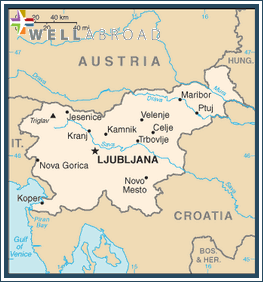|
MOST RECENT ALERTS
There's no recent alert.
|

|
|||||||||||||||
| COUNTRY OVERVIEW | ||||||||||||||||
|---|---|---|---|---|---|---|---|---|---|---|---|---|---|---|---|---|
|
| COUNTRY GENERAL INFORMATION | |||||||
|---|---|---|---|---|---|---|---|
| Language: |
Slovenian 91.1%, Serbo-Croatian 4.5%, other or unspecified 4.4% |
||||||
| Currency: | Euro (EUR) | ||||||
| Predominant Religions: |
Catholic 57.8%, Muslim 2.4%, Orthodox 2.3%, other Christian 0.9%, unaffiliated 3.5%, other or unspecified 23%, none 10.1% |
||||||
| National Holidays: | Independence Day/Statehood Day, 25 June (1991) | ||||||
| Economic Status: |
Slovenia, which on 1 January 2007 became the first 2004 European Union entrant to adopt the euro, is a model of economic success and stability for the region. With the highest per capita GDP in Central Europe, Slovenia has excellent infrastructure, a well-educated work force, and a strategic location between the Balkans and Western Europe. Privatization has lagged since 2002, and the economy has one of highest levels of state control in the EU. |
||||||
| Security: |
Slovenian Army (includes air and naval forces) |
||||||
| US Presence: | |||||||
| Document Requirements: |
Slovenia is a party to the Schengen agreement. As such, U.S. citizens may enter Slovenia for up to 90 days for tourist or business purposes without a visa. The passport should be valid for at least three months beyond the period of stay. For further details about travel into and within Schengen countries, please see our Schengen fact sheet . A valid passport is required. Slovene authorities may confiscate passports with signs of damage, such as missing pages, as suspicious documents, potentially causing travel delays. American citizens entering and exiting Slovenia by personal vehicle are required to have a valid U.S. and International Driver’s License (see our information on Road Safety ); otherwise they may be refused entry into the country and/or fined. All non-EU citizens staying longer than 3 days in Slovenia must register with the local police within 3 days of arrival and inform the office about any change in their address. Registration of foreign visitors staying in hotels or accommodations rented through an accommodation company is done automatically by the hotelier or accommodation company, but visitors staying with family members must register themselves. Registration is available 24 hours a day at police stations and is free of charge. Failure to register can result in a significant fine of up to 400 euros. Note: Although European Union regulations require that non-EU visitors obtain a stamp in their passport upon initial entry to a Schengen country, many borders are not staffed with officers carrying out this function. If an American citizen wishes to ensure that his or her entry is properly documented, it may be necessary to request a stamp at an official point of entry. Under local law, travelers without a stamp in their passport may be questioned and asked to document the length of their stay in Schengen countries at the time of departure or at any other point during their visit, and could face possible fines or other repercussions if unable to do so. Information about dual nationality or the prevention of international child abduction can be found on our web site. For further information about customs regulations, please read our Customs Information sheet. |
||||||
| Major Airports: |
Airports: 14, Airports w/paved runways: 6 Ljubljana D D Airport (LJU/LJLJ) |
||||||
| Servicing Airlines: |
|
||||||
| Risks and Precautions: |
Slovenia remains largely free of terrorist incidents. This assessment takes into account historical data relevant to terrorist activities and recent reporting indicating whether acts could be conducted without prior advance warnings. However, like other countries in the Schengen area, Slovenia shares open borders with its Western European neighbors, allowing the possibility of terrorist groups entering/exiting the country with anonymity. Americans are reminded to remain vigilant with regard to their personal security and to exercise caution. |
||||||
| Mortality Statistics: |
Infant MR total: 4.3 deaths/1,000 live births |
||||||
| Immunization Indicators: |
Required: None |
||||||
| Infectious Disease Concerns: |
Tickborne encephalitis (TBE) is widespread, occurring in warmer months in the southern part of the nontropical forested regions of Europe and Asia. Most intense transmission has been reported in Russia, the Czech Republic, Latvia, Lithuania, Estonia, Hungary, Poland, and Slovenia. The annual incidence rate of tuberculosis is high in some countries in the region. High rates of drug-resistant TB are found in Estonia, Kazakhstan, Latvia, Lithuania, parts of Russia, and Uzbekistan. Cases of diphtheria have declined (after a large outbreak in the 1990s) with improved rates of immunization. |
||||||
| Overall Quality of Medical Services: |
Adequate medical care is readily available. Travelers to Slovenia may obtain a list of English-speaking physicians at the U.S. Embassy or online at http://slovenia.usembassy.gov/medical_assistance.html. Antibiotics, as well as other American-equivalent prescription medications are available at local pharmacies. In Slovenia all medications, including drugs considered over-the–counter and first aid supplies, are dispensed through pharmacies (“lekarna”). For those persons who engage in outdoor activities, a vaccine to prevent tick-borne encephalitis is recommended |
||||||
| Providers in Network: |
|
||||||
| Recent Medical Threats/ Concerns/Warnings: |
Highly pathogenic avian influenza virus H5N1 has been documented in wild birds or other avian species in several of the countries in Eastern Europe. Human cases and death were reported from Azerbaijan in 2006. Avoid all direct contact with birds, including domestic poultry (such as chickens and ducks) and wild birds and avoid places such as poultry farms and bird markets where live birds are raised or kept. For a current list of countries reporting outbreaks of H5N1 among poultry and/or wild birds, view updates from the World Organization for Animal Health (OIE), and for total numbers of confirmed human cases of H5N1 virus by country, see the World Health Organization (WHO) Avian Influenze website
|
||||||
| Communications Info: |
Country Code: +386 |
||||||






